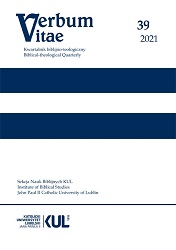Bóg jako źródło moralności. Intuicje św. Augustyna w "Wyznaniach" 7.10–11 w kontekście dyskusji z tradycją starożytną
God as the Source of Morality. St. Augustine’s Intuitions in "Confessions" 7.10–11 in the Context of a Discussion with the Ancient Tradition
Author(s): Martyna KoszkałoSubject(s): Theology and Religion
Published by: Katolicki Uniwersytet Lubelski Jana Pawła II - Wydział Teologii
Keywords: God; the source of morality; Socrates; Plato, Aristotle; St. Augustine; region of dissimilarity; Neoplatonism
Summary/Abstract: In this article, I present the relationship between God/gods and morality in both the Greek religion and philosophy and in the views of St Augustine based on distinctions made by John Hare. I argue that Augustine’s intuitions are indeed complementary to the concept of God as the source of morality present both in the ancient philosophical and religious traditions. In the first part of the article, I show the relation of the gods of Greek popular religion to morality. I argue that being guarantors of morality did not require them to possess exemplary moral character. I then show that a change in this regard took place in the Socratic era. The God/gods of Socrates, Plato, or Aristotle acquire perfect qualities, which sanctions their power to shape morality. Within these concepts, the idea was born of becoming God/god-like and imitating a model of character by performing the actions carried out by God (cognition, moral perfection). God, especially the philosophical God, was also treated as an end and as a felicific object. In the last part of this article, I analyze the concept of St Augustine. I show that, in addition to being the lawgiver and the ultimate felicific end, because He creates beings like Him, God is the source of morality not only as a model of character but above all as a creative being. I show that in committing moral evil, the perpetrator turns away from God and disrupts the ontological order. I present possible interpretations of the expression region of dissimilarity and the textual sources of this concept. I also show those aspects of Augustine’s views that significantly complement and transcend the Neoplatonic model in Confessions 7.10–11.
Journal: Verbum Vitae
- Issue Year: 39/2021
- Issue No: 3
- Page Range: 979-994
- Page Count: 15
- Language: Polish

